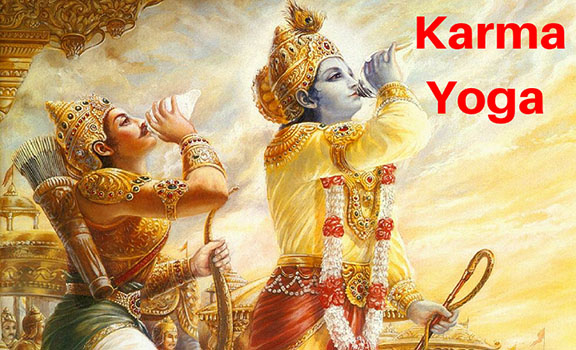Principles and Types of Karma Yoga
4 Apr 2021 HYN Himalayan Yoga Academy

Principles and Types of Karma Yoga
Introduction:
Karma is an act of creation. The literal meaning derived from the Sanskrit word “Kriya” or “Kama” i.e. act- the functional nature or effect of nature or creation. It is the act of existance.In Karma Yoga ,
* The act of natural and permanence of karma creation or existence.
* It is the path of righteous deeds, or selfless service to others.
Practicing Karma Yoga is the most effective process of spiritual development and the goal of Yoga is itself Karma Yoga. Sankalpa, the resolve, is the key for your karmic life and True Awareness / Resolution (Solution) as well. Kaivalya is not obtained if the root of grief or karma is present there. Yoga ia known as a whole karma or Yoga as a karmic state. Karma begins from emptiness to emptiness, visible and invisible.
Definition of Yoga:
” Satimulatadvipako jaatyaayurbhogah: 2.13″ “सति मूले तद्विपाको जात्यायुर्भोग:”। २ .१३
Being at the root, its fructification is birth (in a particular species, a span of life and the experiences, both pleasant and painful of the happiness in life.
“Karmashuklakrishnam Yoginastrividhamitareshaam” p.Y.S. 4.7 = कर्माशुक्लाकृष्णम योगिनास्त्रिविधमितरेषाम ४.७
The yogi’s karma is neither Sukla, nor Krishna or Nishkam. But the deeds of others are of three kinds. E.g. Sukla karma (Good Karma); Krishna karma (Bad Karma); Sukla-Krishna Karma (Good and Bad); Ashukla – Akrishna Karma (No both, Higher Karma)
Buddhiyukto jahatiha ube sukratadushkrute | Tasmadyogaya yujyasva yoga: karmasu kaushalam !! 2.50; बुद्धियुक्तोजहातीहउभेसुकृतदुष्कृते |तस्माद्योगाययुज्यस्वयोग: कर्मसुकौशलम् !!2.५०
A unity in wisdom in this world removes both good deeds and evil deeds; So try for yoga; Yoga is skillful acts of hand, on head and in heart.
Path of Karma: Sacrifice and penance of self, emotion, mind, energy, etc. for better efficiency and experience in work. The first point of karma is the stage of fertilization..
The Four Principles of Karma Yoga
Duty and Responsibility
Everybody has natural duties in life. This natural duty drives you ahead in life. Some duites are for yourself and some others. Some duties are given to you; you don’t have a choice, for example, your duty as a citizen, as a member of society, as a son / daughter, as a brother / sister, etc. Other duties you choose yourself, for example, your duty as an employer, as a husband / wife, as a friend, etc.
In Karma Yoga it is important to prioritize your duties; to know what is most important and which duty you should give more importance over others.
It is important to realize that the highest duty you can have is the duty towards yourself. This means that you should first take care of yourself, do what is good for you and then only you can do what is good for others. It is also important to fulfill your duty at your best. You could have done it better and more detailed but because your working day was almost over you quickly finished the work and went home.
Ego and Intellect:
Ego is all the ideas you have about yourselves or others. It includes our likes, dislikes, desires, etc. With every action we do we tend to think about the consequences for ourselves; how does it affect ourselves, our image, etc. Karma Yoga is all about doing your duty without thinking about yourself. The main purpose of Karma Yoga is to control and eventually let go of your ego. Karma is being acted under intellect, that becomes karma yoga.
It is essential that in the practice of Karma yoga you do not involve your ego because only then you can do it without attachments and desires. Sometimes a person thinks he needs some ego in order to perform better and grow. But ego is like cancer which always keeps growing. It makes us see what we want to see and stops us from seeing reality. It controls our perception and understanding under intellects.
Detachment
Practicing Karma Yoga means doing your duty without attachment, whether you like your duty or not, you still do it your best. You do your duty without any attachment for example if you are a teacher you don’t attache to physical things and finally get free from knowledge as well. You always perform your duty without any kind of attachment to the process or result.
Expectation of achivements
When we do something we rarely do it without expecting something back. For example, at the office, we do our work because we get a salary at the end of the month or for the praise or position. Achivement is universal and eternal, of course! we get finally, but still we have more expectations. We take care of our partner or child, but we expect love and appreciation in return. When you do something without the expectation of reward, the outcome of your action doesn’t affect if and how you do your duty. You do it because it is your duty, not because you get something out of it. Action is always one and desire should be zero , then result will be infinite.
